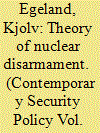|
|
|
Sort Order |
|
|
|
Items / Page
|
|
|
|
|
|
|
| Srl | Item |
| 1 |
ID:
177999


|
|
|
|
|
| Summary/Abstract |
In February 2020, French president Emmanuel Macron invited all interested European states to a “strategic dialogue” on the supposed contribution of France’s nuclear arsenal to European collective security. While certain media commentators relayed Macron’s intervention with approbation and excitement, framing the proposal as an exciting new idea that, if implemented, might boost Europe’s clout on the world stage, the dominant reaction was one of ennui. After all, the argument for Euro-nukes is far from new. In fact, several (mostly French) actors have unsuccessfully attempted to persuade European policymakers of the necessity of European nuclear weapons cooperation for more than half a century. In this article, we investigate the history, merits, and longevity of the case for European nuclear arms. Drawing on secondary literature, policymakers’ writings, and two hitherto untapped surveys of European public opinion conducted by one of the authors, we argue that the case for Euro-nukes is critically flawed with respect to security, strategic autonomy, futurity, and democratic good governance. We maintain that the continuous resurfacing of the “zombie” case for Euro-nukes is made possible by powerful organisational interests, as well as conceptual reversification resulting in enduring contradictions between nuclear vulnerabilities and claims of protection and autonomy.
|
|
|
|
|
|
|
|
|
|
|
|
|
|
|
|
| 2 |
ID:
185996


|
|
|
|
|
| Summary/Abstract |
What might prompt a nuclear-armed state to give up its arsenal? Nuclear disarmament has provided a nominally shared goal for virtually all the world’s states for decades, yet surprisingly little effort has been devoted to systematically theorizing its drivers. This article aims to begin filling this void. I proceed in three steps. First, I discuss the conceptual, material, and ideational features of renunciation to arrive at a rudimentary understanding of what, fundamentally, nuclear disarmament as a political process involves. Second, I scope out the empirical evidence on which a general theory of nuclear renunciation might be based. Third, synthesizing the dominant explanations for the cases discussed in the second part, I outline a basic account of nuclear relinquishment and discuss the compatibility of this account with common assumptions about disarmament practice. I conclude that the best evidence available suggests that adversarial politics and stigmatization are necessary conditions for renunciation.
|
|
|
|
|
|
|
|
|
|
|
|
|
|
|
|
|
|
|
|
|